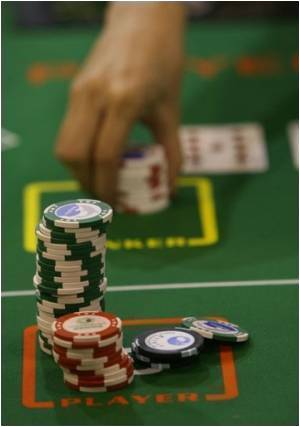Rebecca is battling an often hidden feature of Australian society that has taken her to the brink of suicide -- a gambling addiction.

"For someone who can have a family and be very articulate and can be sensible in so many ways ... just to have something that I have no control over -- people don't see it.
"With alcohol or drugs you see it. With a gambler it's hidden."
Australians like a bet -- on the horses, football games, at casinos, even on the outcome of coin tosses in the national game of "two up".
But the most popular form of betting is on electronic poker machines or "pokies", with the devices installed in pubs and clubs taking more than half of the Aus$19 billion (US$20 billion) the nation spent on gambling in 2008-09.
The country has some 200,000 pokie machines, one of the highest concentrations per capita in the world, and the "one-armed bandits" are hugely popular, contributing some Aus$5 billion in tax revenues each year.
Advertisement
But it found some 15 percent of regular players were problem gamblers, accounting for about 40 percent of total spending on the machines which spin so quickly they can take thousands of dollars from a luckless punter each hour.
Advertisement
Key independent MP Andrew Wilkie, whose support for Labor Prime Minister Julia Gillard's fragile coalition government is vital to its survival, is insisting on reforms to limit the amount people can bet.
Gillard has backed Wilkie's push for a pre-commitment system for all machines that allow a single bet of more than Aus$1, under which gamblers would be unable to bet beyond a nominated limit.
But the decision has prompted outrage from the clubs industry, which has unleashed a furious Aus$20 million publicity campaign under the war cry "It's un-Australian".
"The heritage we are looking to defend is the right of Australians' being able to gamble with their money without being treated like they are doing something shameful or wrong," Clubs New South Wales spokesman Jeremy Bath said.
Bath said the reforms, and the costs of implementing them, would undermine the future of the industry without helping problem gamblers who would be pushed to online betting, which he said studies showed was more addictive.
"This technology, through its punishment of the recreational gambler, will decimate club revenue by at least 40 percent. This is a figure no business, let alone one that is not for profit, could ever hope to survive," he said.
Bath points out that clubs with pokies are not-for-profit businesses which channel part of their revenue back into the community by funding sporting and recreational facilities among other things.
Critics also say the pre-commitment idea is a "nanny state" measure that could allow the government to keep a tab on gamblers through the mandatory card system, resulting in a loss of freedom and privacy.
Wilkie's supporters, however, argue that clubs reliant on problem gamblers do not deserve to be in business, and the loss of privacy argument is hypocrisy given that clubs closely monitor their clients through their loyalty schemes.
The idea of a pre-commitment card has been welcomed by some in the counselling field as a step forward even if it fails to solve the problem.
"It may prevent people to slip towards a full-blown addiction in the first place, but for problem gamblers the way out is motivation and therapy," said Christopher Hunt, who works at a Sydney University treatment clinic.
Baptist minister Tim Costello, a long-time campaigner against the pokies, said he has done too many funerals for people who committed suicide after losing their marriages, jobs and homes to gambling.
"The fruit machines in Britain, you can lose Aus$30-40 an hour, it's a 50 pounds payout per maximum," he said.
"(In Australia) you can lose four or five grand an hour, maximum is Aus$15,000 actually, from pokies and the average losses per hour are something around Aus$2,000. Who spends Aus$2,000 on an hour's entertainment?"
Clubs NSW disputes the Aus$15,000 figure, saying the most a person could lose in an hour in New South Wales was estimated by the Productivity Commission at $1,200 and this was if they were betting the maximum of $10 each time.
Rebecca, not her real name, has lost count of the number of times she has pawned jewellery, or been unable to pay bills or fund a night out because of her addiction to the pokies.
Over the years her relationships, work, finances and health have suffered, to the point where she found herself in hospital two months ago after trying to kill herself.
She is dealing with her problem through Gamblers Anonymous but says she knows, from her experiences in Sydney's pubs and clubs, that there are a lot of other addicts who are not receiving help.
"You see it. You see the fury of the money going in and (people) not pulling at a win but continuing to play or pulling out and going to another machine and losing it all," she said.
"It's quite scary the amount of people that are out there in pubs that if you were to look at their faces, they look absolutely miserable. And they don't seek help."
Source-AFP











